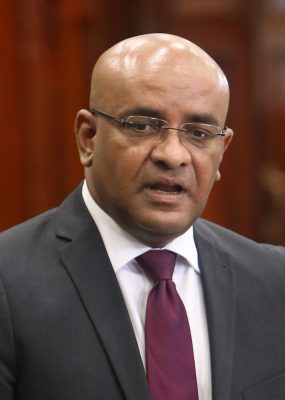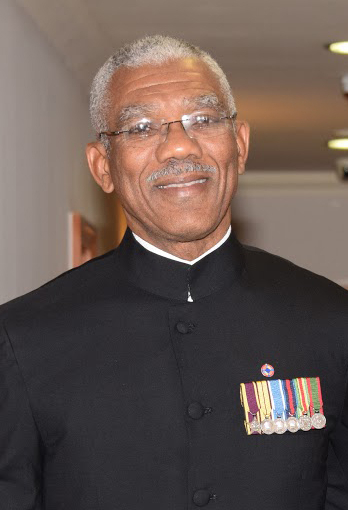Saying that there is no need to issue directions given the resignation of Justice James Patterson from the post of Chairman of the Guyana Elections Commission (GECOM), the Caribbean Court of Justice (CCJ) yesterday urged President David Granger and Opposition Leader Bharrat Jagdeo to ensure the urgent appointment of a replacement.
“The need to issue consequential orders and directions in this case has been rendered largely unnecessary because we understand that the GECOM Chairman has voluntarily resigned his office since the delivery of our judgment on 18 June 2019. It is now a matter of the greatest public importance that the President and the Leader of the Opposition should, as soon as possible, embark upon and conclude the process of appointing a new GECOM Chairman. This imperative is now of the utmost urgency in light of our decision in the no confidence motion cases that the motion was validly passed thereby triggering the need for fresh general elections,” the judgment, which was read by President of the Court, Justice Adrian Saunders, said.

The court had given all parties in the case an opportunity to craft the consequential orders which they thought ought to be issued and to make oral arguments. Yesterday was set aside for the court to announce those consequential orders. The opposition PPP/C had sought from the CCJ a specific timeframe for President Granger to choose a new Chairman. The CCJ, in its ruling yesterday, declined to issue coercive orders, preferring that the functions entrusted to the various stakeholders be carried out.
Within ten minutes, Justice Saunders had completed reading the full judgment in the case which was brought by PPP/C member Zulfikar Mustapha against the Attorney General of Guyana and the Chairman of the Guyana Elections Commissions to challenge Patterson’s unilateral appointment.
Mustapha, who was dissatisfied with the ruling of the Guyana Court of Appeal, approached the Trinidad-based final appeals court for redress.
In its ruling yesterday, the CCJ referred to the views expressed at paragraphs 26 – 29 of its June 18 judgment on the GECOM matter as a suitable frame of reference for the process leading to such an appointment.
Paragraph 26 says, “The requirement for ‘meaningful consultation’ between the Leader of the Opposition and the non-governmental political parties that may be represented in the National Assembly is clear and needs little elaboration. What is not so clear is the process that should be followed to accommodate the spirit of consensus that must prevail between the President and the Leader of the Opposition. The Constitution envisages that this process will culminate in a list of six names being presented to the President, none of whom is unacceptable to the President. This ultimately gives the President the opportunity to select any one of those six persons as Chairman. The question is how do these two constitutional actors interact with each other so as to arrive at that culmination? We are of the view that the most sensible approach is that before a list is submitted, the Leader of the Opposition and the President must communicate with each other in good faith on, and perhaps even meet to discuss, eligible candidates for the position of Chairman. The aim of these discussions must be to agree [to] the names of six persons who fit the stated eligibility requirements and who are not unacceptable to the President. In this regard, the Constitution anticipates that the Leader of the Opposition and the President will conduct themselves in a reasonable and responsible manner, eschew partisanship and seek the best interests of the Republic and the Guyanese people.”
Further, paragraph 27 states, “In our view, employment of the double negative, ‘not unacceptable’, signals that an onus is placed on the President not to find a nominee unacceptable merely because the nominee is not a choice the President would have himself made. The President should only find a nominee unacceptable for some good reason on objective grounds. If a President were permitted, capriciously or whimsically, without proffering a good reason, to reject eligible nominees, this would frustrate the proper working of the Constitution, defeat the intention behind the amendment to Article 161(2) and pave the way for unilateral presidential appointment.”
According to paragraph 28, “Once the President and the Leader of the Opposition have hammered out a list of names not unacceptable to the President, the list, comprising the six persons, must then formally be submitted to the President by the Leader of the Opposition and the President must then select the Chairman from among those names. This approach gives the President a role in the identification of the six names, but it obviates the possibility that, after the formal presentation of the list, the President could suggest that one or more of the names, or indeed the entire list, is ‘unacceptable’. Unilateral appointment by the President in keeping with the proviso to Article 161(2) can hardly be an option if the Leader of the Opposition demonstrates a willingness to engage in good faith the process outlined above.”
And paragraph 29 states “…the President’s power to appoint the Elections Commission Chairman in keeping with Article 161(2) is a constitutionally prescribed responsibility that is subject to judicial scrutiny. In reviewing what transpired here between 22 November 2016 and 19 November 2017, it is evident to us that the President was not entitled to lay down, as a precondition to considering a nominee, eligibility requirements that were additional to or at variance with those prescribed by the Constitution. So, for example, it was unfortunate that the President considered or was advised that an acceptable candidate should either have or be deemed to have wide electoral knowledge and experience. As Counsel for Mr Mustapha pointed out, it is not unusual for a distinguished judge to have gone through her entire judicial career without trying a single elections case.”
The CCJ reminded yesterday that it concluded that the process that resulted in the unilateral appointment by the President of the GECOM Chairman was flawed and in breach of the Constitution.
The court said that in all circumstances, it orders and declares that the process utilised to appoint Justice Patterson to the post of GECOM Chairman was flawed and in breach of the Constitution and was also void. Additionally, the court ordered that costs in this appeal and in the courts below be paid to the Appellant and borne by the Attorney General.
The ruling comes amidst a stalemate between representatives of the two political leaders, who had met multiple times to shortlist six names that will be “not unacceptable” to the president. That list of names is to be presented to the President by the Opposition Leader from which he must choose one to be appointed Chairman.
The representatives on Thursday spent another two hours attempting to “hammer out” a list of names to be submitted to Jagdeo for him to consider and submit to Granger but they failed to find consensus and concluded that “the two principals should meet”. It was hoped that the two would have met yesterday to consider potential candidates. No such meeting took place and it is unclear when such a meeting will be held.





